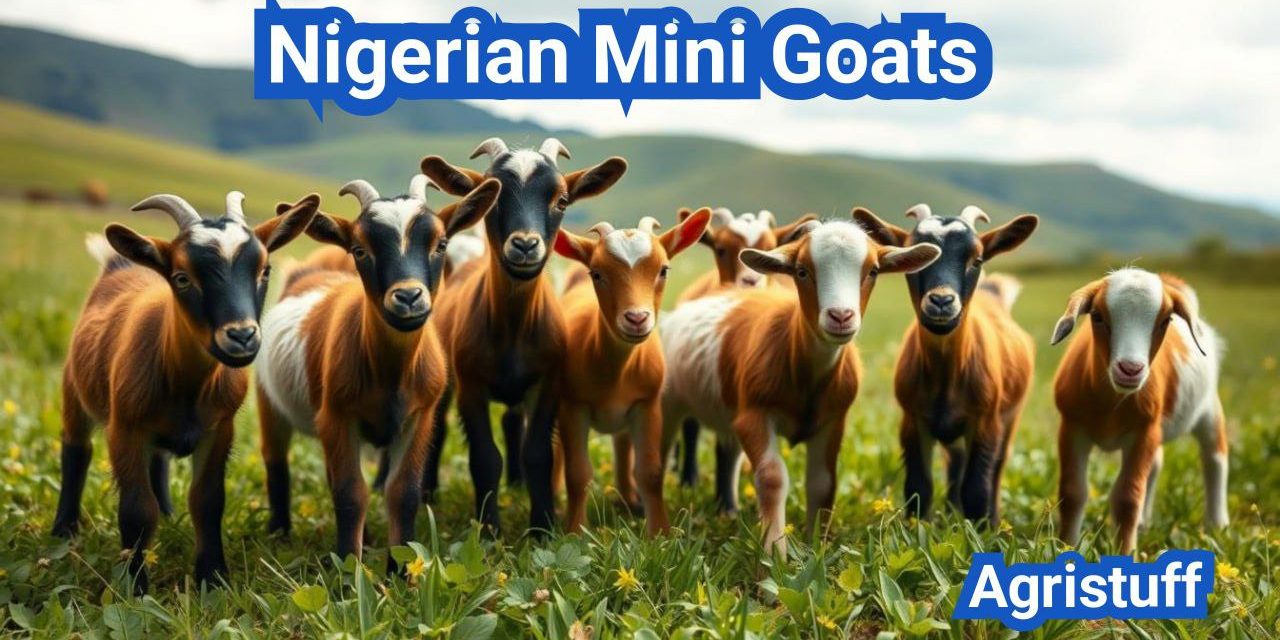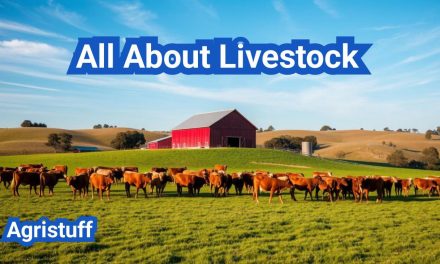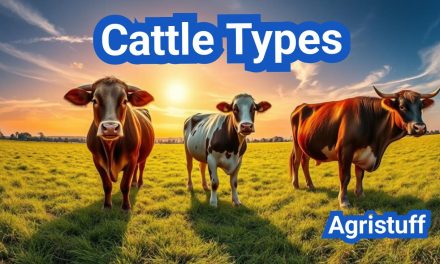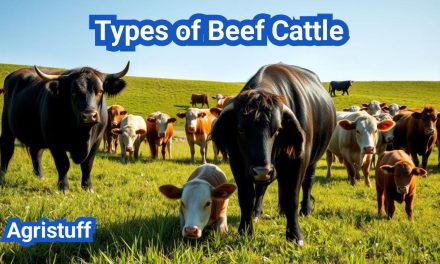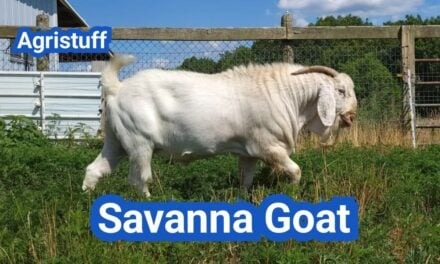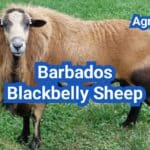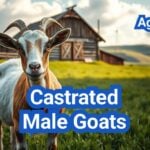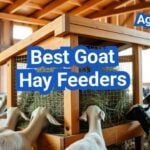The Nigerian Dwarf Goat ( Nigerian Mini Goats ) is a popular breed known for its compact size and dairy production capabilities. Originating from West Africa, these miniature dairy goats have gained popularity in the United States as both pets and dairy providers.
These compact farm animals typically weigh around 70 pounds and stand about 21 inches high, making them an ideal choice for small farms or homesteads. Their lifespan is a significant factor for potential owners, as they can live for many years with proper care.
Key Takeaways
- Compact size, ideal for small farms or homesteads
- Known for dairy production
- Average weight: around 70 pounds
- Average height: about 21 inches
- Can serve as both pets and dairy providers
What Are Nigerian Dwarf Goats?
With their compact stature and impressive milking capabilities, Nigerian Dwarf Goats have become a favorite among goat enthusiasts. These miniature goats are not only adorable but also pack a punch when it comes to dairy production.
Origin and History of Nigerian Mini Goats
Nigerian Dwarf Goats have a rich history that traces back to West Africa. They were originally bred from the African Pygmy goat breed. Over time, they were introduced to the United States, where they were further developed into the distinct Nigerian Dwarf breed we know today.
Their development involved selective breeding to enhance their milking capabilities while retaining their small size. This selective breeding has made them one of the most popular miniature dairy goat breeds in the United States.
Breed Characteristics of Nigerian Mini Goats
Nigerian Dwarf Goats are known for their small size and high milk production. Despite their compact stature, they can produce up to half a gallon of milk per day. Their milk is rich in butterfat, making it ideal for cheese and butter production.
One of the unique features of Nigerian Dwarf Goats is their full-size teats, which make hand-milking easier compared to other miniature breeds. They come in a variety of coat colors and patterns, adding to their visual appeal.
In terms of temperament, Nigerian Dwarf Goats are known for being friendly and sociable. They are often kept as pets due to their gentle nature and relatively low maintenance care.
Nigerian Mini Goats: Size and Physical Attributes
The Nigerian Dwarf goat breed is characterized by its small stature and varied coat colors. These miniature goats are not only charming but also possess a range of physical attributes that make them unique.
Average Weight and Height of Nigerian Mini Goats
Nigerian Dwarf goats are known for their compact size. On average, they weigh around 70 pounds and stand about 21 inches high at the shoulder. Their small size makes them an ideal choice for small farms or homesteads with limited space.
Coat Colors and Patterns of Nigerian Mini Goats
One of the striking features of Nigerian Mini Goats is their diverse range of coat colors and patterns. They can be found in a variety of colors, including:
- Black
- White
- Red
- Brown
- Spotted or patterned variations
This diversity in coat colors adds to their appeal as pets or dairy animals.
Horned vs. Polled Varieties of Nigerian Mini Goats
Nigerian Dwarf goats can be either horned or polled. The presence or absence of horns is a genetic trait and does not affect their milk production or temperament. Both horned and polled varieties are recognized within the breed standard.
Some breeders and owners prefer to keep polled goats to reduce the risk of injury from horns, while others appreciate the traditional look of horned goats. Ultimately, the choice between horned and polled Nigerian Dwarfs depends on personal preference and management practices.
Lifespan and Development Stages

Understanding the lifespan and development stages of Nigerian Dwarf Goats is crucial for providing optimal care. Nigerian Dwarf Goats are known for their relatively long lifespan compared to some other breeds.
Average Lifespan of Nigerian Mini Goats
The average lifespan of Nigerian Dwarf Goats ranges from 12 to 14 years, with some living up to 16 years or more with proper care and management. Factors such as genetics, nutrition, and health conditions play a significant role in determining their lifespan.
Kid to Adult Development of Nigerian Mini Goats
Nigerian Dwarf Goats go through several development stages from kid to adult. Kids are born after a gestation period of approximately 145 to 150 days. At birth, they weigh between 2 to 4 pounds. The development stages include:
- Kidhood (0-6 months): Kids rely on their mother’s milk and start to wean off around 2-3 months.
- Juvenile (6 months-1 year): At this stage, they start to eat more solid foods and become more independent.
- Adolescence (1-2 years): Nigerian Dwarf Goats reach breeding age during this period.
Aging and Senior Care of Nigerian Mini Goats
As Nigerian Dwarf Goats age, their care requirements change. Senior goats need more attention to their nutritional needs, hoof care, and overall health. Regular veterinary check-ups become more crucial to manage age-related health issues.
Providing a comfortable living environment and adjusting their diet according to their age can significantly improve their quality of life. Owners should be prepared to provide extra care and attention to their senior goats to ensure they live out their years comfortably.
Nigerian Dwarf Goats as Dairy Animals
With their compact size and robust dairy production, Nigerian Dwarf Goats are an attractive option for those interested in miniature dairy goats. These goats are not only efficient in terms of space but also provide a significant amount of milk.
Milk Production Capabilities of Nigerian Mini Goats
Nigerian Dwarf Goats are excellent milkers, capable of producing up to a half gallon of milk per day. This level of production makes them suitable for goat milking at home, providing a steady supply of fresh milk for various dairy products.
The milk produced by Nigerian Dwarf Goats is particularly valued for its high butterfat content, which is ideal for making rich and creamy dairy products such as cheese, butter, and ice cream.
High Butterfat Content Benefits of Nigerian Mini Goats
The high butterfat goat milk from Nigerian Dwarf Goats is rich in nutrients and has a superior taste compared to lower butterfat content milk. This makes it highly sought after by artisans who produce dairy products.
Some of the benefits of high butterfat milk include:
- Enhanced flavor in dairy products
- Increased nutritional value
- Better texture for cheese and butter production
Lactation Cycles of Nigerian Mini Goats
Understanding the lactation cycles of Nigerian Dwarf Goats is crucial for maximizing their dairy potential. These goats typically have a lactation period that can last around 8 to 10 months, after which they are dried off to prepare for the next kidding.
Effective management of the lactation cycle involves regular milking, proper nutrition, and health care to ensure continuous milk production.
Products from Nigerian Dwarf Goat Milk

With its high nutritional value, Nigerian Dwarf Goat milk is ideal for producing a range of dairy products. The richness of this milk makes it perfect for crafting various items that can be consumed or used for personal care.
Cheese Making Basics of Nigerian Mini Goats
One of the most popular uses of Nigerian Dwarf Goat milk is cheese making. The process involves curdling the milk, separating the curds from the whey, and then shaping the curds into the desired form. Cheese making can be a fun and rewarding hobby, allowing you to create a variety of cheeses tailored to your taste preferences.
The basic steps in cheese making include:
- Preparing the milk by heating it to the appropriate temperature
- Adding a coagulant to curdle the milk
- Cutting the curds to release more whey
- Draining the whey and shaping the curds
- Aging the cheese to develop its flavor and texture
Soap and Lotion Production of Nigerian Mini Goats
Nigerian Dwarf Goat milk is also used in the production of soap and lotion due to its moisturizing properties. The milk contains vitamins and minerals that nourish the skin, making it an excellent ingredient for skincare products. Soap making involves mixing the milk with oils and lye, then shaping and curing the mixture to create a mild, moisturizing soap.
| Product | Benefits | Uses |
|---|---|---|
| Goat Milk Soap | Moisturizing, gentle on skin | Personal hygiene, gift items |
| Goat Milk Lotion | Nourishing, hydrating | Skincare, dry skin relief |
| Cheese | Rich in protein, calcium | Culinary, gourmet gifts |
Other Dairy Products of Nigerian Mini Goats
Apart from cheese and soap, Nigerian Dwarf Goat milk can be used to make other dairy products such as yogurt, butter, and ice cream. These products are not only delicious but also offer a range of health benefits due to the nutritional content of the milk.
By utilizing Nigerian Dwarf Goat milk, individuals can create a variety of products that are both enjoyable and beneficial for health and personal care. Whether you’re interested in dairy products for consumption or for crafting personal care items, the milk of Nigerian Dwarf Goats is a valuable resource.
Setting Up Your Goat Housing
Proper goat housing is essential for protecting your Nigerian Dwarf Goats from the elements and predators. A well-designed shelter can significantly impact the health and well-being of your goats.
Shelter Requirements of Nigerian Mini Goats
The shelter for your Nigerian Dwarf Goats should provide adequate protection from wind, rain, and extreme temperatures. A sturdy structure with a waterproof roof is crucial. The shelter should also be well-ventilated to prevent the buildup of moisture and ammonia from the goats’ urine.
Key considerations for shelter include:
- Dry and well-ventilated environment
- Protection from wind and rain
- Adequate space for movement
Space Needs Per Goat
Nigerian Dwarf Goats require sufficient space to move around comfortably. The general rule of thumb is to provide at least 10-15 square feet per goat inside the shelter. However, the total area should also account for feeding, milking, and exercise areas.
Adequate space is crucial for reducing stress and promoting the overall health of your goats.
Bedding Options of Nigerian Mini Goats
The choice of bedding material is important for maintaining cleanliness and comfort. Common bedding options include straw, hay, and wood shavings. The bedding should be dry and changed regularly to prevent health issues.
Popular bedding materials include:
- Straw
- Hay
- Wood shavings
Each has its advantages, and the choice may depend on availability and cost.
Fencing Requirements for Nigerian Dwarf Goats

To prevent escape and predation, appropriate fencing is essential for Nigerian Dwarf Goats. These agile and curious animals require secure enclosures to protect them from harm and prevent them from getting loose.
Fencing for Nigerian Dwarf Goats serves multiple purposes: it keeps the goats contained, protects them from predators, and prevents them from damaging neighboring properties. The type of fencing used is critical to achieving these goals.
Recommended Fence Types of Nigerian Mini Goats
There are several fencing options suitable for Nigerian Dwarf Goats, including:
- High-tensile wire fencing: Known for its durability and strength, this type of fencing is effective against predators.
- Wooden fencing: Attractive and sturdy, wooden fences can be used to create enclosures that are both functional and aesthetically pleasing.
- Electric fencing: A cost-effective option that can be an effective deterrent against predators and escape attempts.
When choosing a fence type, consider factors such as the size of your property, the number of goats you have, and your budget.
Fence Height and Security of Nigerian Mini Goats
The height of the fence is crucial in keeping Nigerian Dwarf Goats contained. A minimum height of 4 feet is recommended, but for added security, especially against predators like coyotes, a height of 5 feet or more is advisable.
Key considerations for fence security include:
- Using materials that are difficult for goats to climb or jump over.
- Ensuring the fence is well-maintained and free from damage.
- Burying the fence underground to prevent burrowing predators.
By investing in appropriate fencing, Nigerian Dwarf Goat owners can ensure the safety and well-being of their animals.
Feeding Your Nigerian Mini Goats

To keep your Nigerian Mini Goats healthy, it’s essential to know their dietary requirements. Nigerian Dwarf Goats are compact farm animals with specific nutritional needs that must be met for optimal health.
Daily Nutritional Requirements of Nigerian Mini Goats
Nigerian Dwarf Goats require a balanced diet that includes a mix of hay, forage, and concentrates. Their daily nutritional requirements depend on factors such as age, size, and lactation status.
A general guideline for feeding Nigerian Dwarf Goats is to provide 1-2% of their body weight in dry matter per day. For example, a 20-pound goat would need 0.2-0.4 pounds of dry matter daily.
“Goats are very sensitive to dietary changes, so any changes should be made gradually to prevent digestive upset.” – Goat Nutrition Expert
Hay and Forage Options of Nigerian Mini Goats
High-quality hay is a staple in a Nigerian Dwarf Goat’s diet. Options include timothy hay, alfalfa hay, and a mix of grass hays. Forage such as pasture grasses, leaves, and shrubs can also be provided.
| Hay Type | Nutritional Content | Palatability |
|---|---|---|
| Timothy Hay | High in fiber, low in protein | High |
| Alfalfa Hay | High in protein, calcium | Very High |
| Mixed Grass Hay | Balanced nutrients | Medium |
Supplements and Treats of Nigerian Mini Goats
In addition to hay and forage, Nigerian Dwarf Goats may require supplements to ensure they receive all necessary nutrients. Common supplements include minerals and vitamins.
Treats can be given in moderation and include fruits, vegetables, and grains. However, it’s crucial to avoid giving them too many treats, as this can lead to nutritional imbalances.
By understanding and meeting the nutritional needs of your Nigerian Mini Goats, you can ensure they lead healthy and productive lives.
Nigerian Dwarf Goats as Pets

With their small stature and affectionate personalities, Nigerian Dwarf goats make great companions. Their suitability as pets depends on several factors, including their temperament, compatibility with children and other pets, and the ease of training.
Temperament and Personality of Nigerian Mini Goats
Nigerian Dwarf goats are known for their friendly and outgoing personalities. They are social animals that thrive on interaction, not just with other goats, but also with humans. Their temperament is generally gentle, making them a good choice for a pet, provided you are willing to invest time in their care and socialization.
Socialization is key to developing a well-adjusted Nigerian Dwarf goat. They need to be handled regularly from a young age to become comfortable with human interaction. This includes gentle handling, feeding by hand, and exposure to various environments to help them become confident and calm in new situations.
Compatibility with Children and Other Pets
Nigerian Dwarf goats can be an excellent addition to families with children, teaching them about responsibility and compassion for animals. However, it’s crucial to supervise interactions between young children and goats to ensure the safety and well-being of both. The goats should be treated with respect and care, and children should be taught how to interact with them gently.
When it comes to other pets, Nigerian Dwarf goats generally get along well, especially if they are introduced to each other at a young age. However, their strong instinct to browse and play can sometimes be misinterpreted as aggression by other pets, so initial introductions should be done carefully.
Training Basics of Nigerian Mini Goats
Training a Nigerian Dwarf goat is relatively straightforward due to their intelligence and willingness to please. Basic training includes housebreaking, walking on a leash, and basic commands. Positive reinforcement techniques, such as offering treats and praise, are highly effective.
| Training Aspect | Description | Tips for Success |
|---|---|---|
| Housebreaking | Training the goat to use a specific area for waste | Consistency and positive reinforcement |
| Leash Training | Getting the goat accustomed to walking on a leash | Start with short sessions, gradually increase duration |
| Basic Commands | Teaching simple commands like “come” and “stay” | Use treats and praise for positive reinforcement |
In conclusion, Nigerian Dwarf goats can make wonderful pets for the right owner. Their friendly nature, intelligence, and relatively low maintenance care make them an attractive option for those willing to provide the necessary care and attention.
Health Care for Nigerian Dwarf Goats

To keep Nigerian Dwarf Goats healthy, it’s crucial to understand their susceptibility to certain health issues and implement preventive measures. “A healthy goat is a happy goat,” as the saying goes, and this rings true for Nigerian Dwarf Goats, which require diligent care to thrive.
Common Health Issues of Nigerian Mini Goats
Nigerian Dwarf Goats are susceptible to various health issues, including parasites, respiratory infections, and reproductive problems. Regular monitoring is essential to identify these issues early.
- Parasites: Internal parasites like worms can cause significant health problems.
- Respiratory infections: Pneumonia is a common issue, especially in young or stressed goats.
- Reproductive issues: Does may experience complications during kidding, requiring veterinary assistance.
Vaccination Schedule of Nigerian Mini Goats
A well-planned vaccination schedule is vital for protecting Nigerian Dwarf Goats against diseases. Consult with a veterinarian to determine the best vaccination program for your herd.
- CDT vaccination: Protects against Clostridium and tetanus.
- Booster shots: Regular boosters are necessary to maintain immunity.
Parasite Prevention and Treatment of Nigerian Mini Goats
Effective parasite control is critical for maintaining the health of Nigerian Dwarf Goats. This involves a combination of management practices and, when necessary, medical treatments.
- Rotational grazing: Helps reduce parasite loads by breaking the parasite life cycle.
- Fecal exams: Regular checks to monitor parasite levels.
- Deworming: Targeted deworming programs based on fecal exam results.
By understanding and addressing these health care needs, you can help ensure the well-being of your Nigerian Dwarf Goats and maintain a healthy, productive herd.
Milking Your Nigerian Dwarf Goats
The process of milking Nigerian Dwarf Goats requires attention to detail and the right equipment to ensure high-quality milk. Milking these goats can be a rewarding experience, providing fresh milk for various dairy products.
Milking Equipment Needed of Nigerian Mini Goats
To milk your Nigerian Dwarf Goats effectively, you’ll need specific equipment. This includes a milking stand, milking pail, teat dip, and a milk strainer. Investing in good-quality equipment will make the milking process smoother and help maintain the health of your goats.
Essential Milking Equipment:
- Milking Stand
- Milking Pail
- Teat Dip
- Milk Strainer
Step-by-Step Milking Process of Nigerian Mini Goats
Milking Nigerian Dwarf Goats involves a straightforward process that, when followed correctly, ensures the quality of the milk and the comfort of the goat.
- Prepare the milking area and equipment.
- Clean the udder and teats with a teat dip.
- Stimulate milk letdown.
- Begin milking, ensuring to strip the teats completely.
- Apply teat dip after milking to prevent infection.
Milk Storage and Safety
After milking, it’s crucial to store the milk properly to maintain its quality and safety. Milk should be strained and cooled immediately.
| Storage Method | Temperature | Duration |
|---|---|---|
| Refrigeration | 39°F (4°C) | Up to 3 days |
| Freezing | -18°C (0°F) | Up to 6 months |
Proper milking techniques and storage practices are key to enjoying high-quality milk from your Nigerian Dwarf Goats. By following these guidelines, you can ensure a healthy and productive milking experience.
Managing a Backyard Goat Herd

To successfully manage a backyard goat herd, one must consider the ideal herd size, dynamics, and daily routine. Effective management is crucial for the health and well-being of the goats, as well as the overall success of the backyard goat-keeping endeavor.
Ideal Herd Size for Beginners of Nigerian Mini Goats
For those new to backyard goat keeping, determining the ideal herd size is a critical decision. A smaller herd size is generally recommended for beginners, as it allows for a more manageable and less overwhelming experience.
- A minimum of two goats is often suggested to provide companionship for the animals.
- A maximum of three to four goats is typically recommended for beginners, allowing for a diverse and engaging herd without becoming too difficult to manage.
Herd Dynamics and Behavior of Nigerian Mini Goats
Understanding herd dynamics and behavior is vital for maintaining a harmonious and healthy backyard goat herd. Goats are social animals that thrive in the company of others.
Key aspects of herd dynamics include:
- Establishing a pecking order within the herd.
- Recognizing signs of stress or aggression.
- Ensuring adequate space and resources for all goats.
Daily Management Routine of Nigerian Mini Goats
A daily management routine is essential for the health and well-being of the goats in a backyard herd. This routine should include:
- Regular feeding and watering.
- Cleaning of living areas.
- Monitoring of health and behavior.
- Providing adequate exercise and mental stimulation.
By following a consistent daily routine, backyard goat keepers can help prevent health issues and ensure their goats lead happy and productive lives.
Breeding Nigerian Mini Goats for Beginners

As a beginner, breeding Nigerian Mini Goats involves learning about the optimal breeding age, pregnancy care, and kid care. Nigerian Dwarf Goats are known for their friendly nature and high milk production, making them a popular choice among goat breeders.
Breeding Age and Season of Nigerian Mini Goats
Nigerian Dwarf Goats can be bred as early as six months of age, but it’s recommended to wait until they are at least a year old to ensure they are physically mature. The breeding season typically starts in late summer or early fall, but Nigerian Dwarfs can breed year-round due to their ability to come into heat frequently.
Breeding Age Guidelines:
- Minimum breeding age: 6 months
- Recommended breeding age: 1 year
- Breeding season: Late summer to early fall, but can breed year-round
Pregnancy and Kidding of Nigerian Mini Goats
The gestation period for Nigerian Dwarf Goats is approximately 145 days. During pregnancy, it’s crucial to provide proper nutrition and care to ensure the health of both the doe and the kids.
| Stage | Duration | Care Requirements |
|---|---|---|
| Early Pregnancy | 0-3 months | Regular check-ups, balanced diet |
| Late Pregnancy | 3-5 months | Increased nutrition, monitoring for complications |
| Kidding | – | Assistance during delivery, post-kidding care |
Kid Care Basics of Nigerian Mini Goats
After kidding, it’s essential to provide the kids with adequate care, including feeding colostrum, ensuring proper nutrition, and monitoring their health.
Key Kid Care Practices:
- Feed colostrum within the first hour of birth
- Provide a nutritious diet suitable for kids
- Monitor kid health and address any issues promptly
Legal Considerations for Keeping Goats in the USA
The legality of keeping Nigerian Mini goats in the US is contingent upon compliance with local zoning laws and regulations. As a prospective or current Nigerian Dwarf goat owner, understanding these legal considerations is crucial for ensuring the well-being of your animals and avoiding potential legal issues.
Zoning Laws and Regulations of Nigerian Mini Goats
Zoning laws vary significantly across different states and municipalities in the USA. These laws dictate what types of animals can be kept on a property, the size of the property required for keeping certain animals, and the specific conditions under which they can be kept. For Nigerian Dwarf goats, it’s essential to check local ordinances regarding:
- The minimum acreage required to keep goats
- Fencing requirements to prevent escape or trespass
- Proximity to neighboring properties or residential areas
- Any necessary permits or licenses to keep goats
Compliance with these regulations is vital to avoid fines or the forced removal of your goats.
Registration and Identification Requirements of Nigerian Mini Goats
In addition to zoning laws, Nigerian Dwarf goat owners must also comply with registration and identification requirements. The American Dairy Goat Association (ADGA) and the American Goat Federation (AGF) are two organizations that provide registration services for Nigerian Dwarf goats. Registration helps to:
- Verify the breed and lineage of your goats
- Participate in breed-specific events or competitions
- Enhance the value of your goats for breeding purposes
Identification methods such as ear tagging, tattooing, or microchipping are also important for managing your goat herd and complying with local regulations.
By understanding and adhering to these legal considerations, Nigerian Dwarf goat owners in the USA can enjoy the benefits of keeping these wonderful animals while minimizing the risk of legal complications.
At The End of: Nigerian Mini Goats
Nigerian Dwarf Goats offer a unique opportunity for dairy production and companionship. With proper care and management, they can thrive in various settings, providing a rewarding experience for owners.
As highlighted in this guide, Nigerian mini goats are versatile animals that can be used for dairy purposes or kept as pets. Their small size, gentle nature, and relatively low maintenance make them an attractive choice for many.
Whether you’re interested in producing your own dairy products or simply looking for a friendly companion, Nigerian Dwarf Goats are definitely worth considering. By understanding their needs and providing appropriate goat care, you can enjoy the many benefits they have to offer.
For those looking to start or expand their dairy goat herd, Nigerian Dwarf Goats are an excellent option. Their high butterfat content and rich milk make them ideal for cheese making, soap production, and other dairy products.
FAQ
What is the average lifespan of Nigerian Dwarf Goats?
Nigerian Dwarf Goats typically live between 12 to 14 years, with some living longer with proper care and management.
How big do Nigerian Dwarf Goats get?
Nigerian Dwarf Goats are compact animals, with adults typically standing between 17 and 23 inches tall at the shoulder and weighing between 20 and 40 pounds.
Are Nigerian Dwarf Goats good dairy animals?
Yes, Nigerian Dwarf Goats are known for their high-quality milk, which is rich in butterfat, making it ideal for cheese and other dairy products.
Can Nigerian Dwarf Goats be kept as pets?
Yes, Nigerian Dwarf Goats can make great pets due to their friendly, curious, and playful nature. They are suitable for families with children and can be trained to be well-behaved companions.
What are the nutritional needs of Nigerian Dwarf Goats?
Nigerian Dwarf Goats require a balanced diet that includes high-quality hay, forage, and limited amounts of grains and supplements. They need access to fresh water at all times.
How often should Nigerian Dwarf Goats be milked?
Nigerian Dwarf Goats typically need to be milked twice a day, with the frequency and duration of milking depending on their lactation cycle and milk production.
What kind of fencing is required for Nigerian Dwarf Goats?
Nigerian Dwarf Goats require sturdy fencing that is at least 4 feet tall to prevent escape. The fencing should be made of materials like wood, metal, or a combination of both, and should be secure to prevent predator entry.
Can Nigerian Dwarf Goats be bred year-round?
Nigerian Dwarf Goats can be bred year-round, but the breeding season typically peaks in the fall. Does are typically bred when they are at least 7 months old and in good health.
What are the common health issues in Nigerian Dwarf Goats?
Nigerian Dwarf Goats are prone to health issues like parasites, respiratory infections, and hoof problems. Regular veterinary care, vaccinations, and parasite control measures can help prevent these issues.
Are Nigerian Dwarf Goats compatible with other pets?
Nigerian Dwarf Goats can be compatible with other pets if introduced properly and socialized from an early age. However, they may require separate housing and management to ensure their safety and well-being.
What are the legal considerations for keeping Nigerian Dwarf Goats in the USA?
The laws and regulations regarding keeping Nigerian Dwarf Goats vary by state and locality. Owners should check with their local authorities to determine the specific requirements for registration, identification, and zoning.
Conclusion of: Nigerian Mini Goats
Introduction: Meet Nigerian Mini Goats
When you’re thinking about choosing small-scale livestock, Nigerian Mini Goats are a top option for both pet enthusiasts and dairy producers. These compact, friendly goats—often called Nigerian Dwarf goats—offer both affectionate companionship and excellent milk quality, making them ideal for a wide range of farm and backyard settings.
Learn more about their versatility from the American Dairy Goat Association.
Origins and Breed History
Nigerian Mini Goats originated from West African dwarf goat populations. They were introduced in the mid-20th century and selectively bred throughout the 1980s to enhance dairy traits. Today, they are widely recognized for their charming appearance and productive capabilities as both dairy and pet goats.
Explore their history further via The Livestock Conservancy.
Physical Characteristics
Nigerian Mini Goats are small and sturdy. Does typically stand around 21–24 inches tall at the shoulder and weigh 40–60 pounds, with bucks being slightly larger. Their coats come in a wide array of colors—solid black, white, brown, gold, and combinations like spotted or pied patterns. Many are born hornless or are gently disbudded for handling safety. Their petite size makes them easy to manage on smaller properties.
For breed standards, visit the Miniature Dairy Goat Association.
Temperament and Behavior
One of the standout features of Nigerian Mini Goats is their gentle, curious, and playful nature. They enjoy human interaction, can learn simple cues, and form strong bonds with their caregivers. While they can bleat when hungry or in heat, they are generally quieter than larger goat breeds. Their amiable time with people makes them great for families, therapy programs, and educational settings.
Read about their behavior in Hobby Farms’ guide.
Feeding and Nutrition
As efficient and versatile eaters, Nigerian Mini Goats thrive on quality hay, grains, goat-specific mineral mixes, and constant access to fresh water. They also enjoy browse such as shrubs, weeds, and young tree shoots, which helps with natural lawn and vegetation control. Providing enrichment—like scratching posts, logs, and toys—can help prevent boredom and contribute to their overall well-being.
For nutritional tips, consult Penn State Extension’s goat resources.
Shelter, Fencing, and Companionship
It’s essential to provide Nigerian Mini Goats with a safe and comfortable environment. A dry, secure shelter protects them from rain, wind, and extremes of temperature. Fencing should be at least 4–5 feet high and sturdy enough to prevent climbing and escapes—goats are clever and often test boundaries. Because they are herd animals, it’s best to keep them in pairs or small groups. A single goat tends to become lonely or stressed, which can lead to behavior issues.
See housing recommendations from A Better Way Farms.
Breeding, Reproduction, and Lifespan
Nigerian Mini Goats mature early—bucks can breed as young as 3–4 months, while does typically enter breeding age around 7–8 months. Their gestation lasts roughly 145–153 days, and they frequently deliver twins or triplets; occasionally, quads occur. With proper care, they can live between 10 and 16 years, though dairy does often reach the higher end of that range.
For breeding insights, refer to Goat Journal.
Milk Production: Quality and Yield
Despite their small stature, Nigerian Mini Goats are notable performers in dairy. They generally produce between 1 and 3 quarts of milk daily. Specialty dairy lines can yield even more. Their milk is known for its high butterfat content (6–10%) and relatively high protein, making it excellent for cheese, yogurt, butter, soap making, and direct consumption. With appropriate breeding and care, they can provide a consistent supply throughout the year.
Dive deeper into milk metrics at Stoney Creek Farm.
Pet or Dairy? Dual-Purpose Appeal
As Pets
Their gentle, compact nature makes Nigerian Mini Goats excellent as pets. They respond well to handling, can be leash-trained, and some even thrive in structured activities like goat yoga. They are favored by families, as well as for therapeutic and educational purposes.
As Dairy Animals
In addition to being delightful pets, they are also productive small-scale dairy goats. Their efficient feed conversion, ability to breed year-round, and rich milk quality make them cost-effective. They are well-suited for value-added home products or small homestead operations, such as making cheese, soap, or goat milk lotion.
Compare pet vs. dairy roles via Farmhouse Guide.
Health and Grooming
To keep Nigerian Mini Goats healthy and thriving, follow these routine care steps:
- Trim hooves every 6–8 weeks to prevent hoof-related issues.
- Vaccinate per veterinarian recommendations and manage parasite loads.
- Groom regularly to monitor skin and coat health.
- Observe closely for signs of illness—respiratory issues, parasites, mastitis—and consult a veterinarian early.
For health protocols, see USDA Goat Care Guidelines.
Pros and Cons of Owning Nigerian Mini Goats
| Pros | Cons |
|---|---|
| Affectionate, curious, and compact | Can be vocal when seeking attention |
| High butterfat milk ideal for artisanal uses | Requires secure, tall fencing |
| Efficient eaters with dual-purpose roles | Must be kept in social groups |
| Effective in weed control and manure production | Local zoning may impose restrictions |
| Long lifespan (10–16 years) | Requires regular grooming and vet care |
Legal and Zoning Considerations
Before acquiring Nigerian Mini Goats, check your city or county regulations. Some areas have zoning restrictions on livestock, limiting herd size or requiring permits. Always purchase from reputable breeders who offer health records and adhere to best practices in animal husbandry.
Check zoning laws via American Goat Federation.
Getting Started: A Step-By-Step Plan
- Verify local zoning regulations and permits.
- Select a responsible breeder with good health track records.
- Prepare housing, fencing, and shelter well before bringing goats home.
- Acquire at least two goats to prevent social isolation.
- Set up a balanced feeding plan with hay, minerals, and browse.
- Gather essential equipment: milking stand, grooming tools, feed pails.
- Schedule regular veterinary visits for hoof trimming and health care.
- Clarify your goals—whether you’re raising goats for pets, dairy, or both.
Final Thought
Nigerian Mini Goats are a wonderful choice for those looking for affectionate pets or efficient dairy animals. Their manageable size, friendly disposition, and high-quality milk make them ideal for small farms, sustainable homesteads, or family-oriented projects. With proper preparation—including housing, nutrition, healthcare, and social grouping—you’ll enjoy years of rich milk, joyful interaction, and environmental enrichment from your Nigerian Mini Goats.

